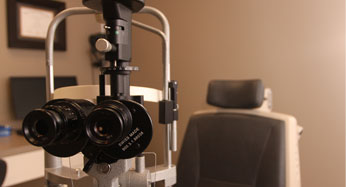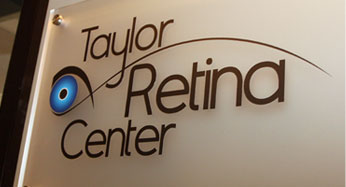Our retina specialists are board certified in ophthalmology, have completed a retina disease fellowship and have performed thousands of retina procedures. Our doctors and their staff share a common mission to provide the most up-to-date medical care in an environment that is compassionate and patient-centered.
Retina Lasers
Lasers have been used for 40 years to treat various retinal conditions. Thermal retina laser is different than lasers used in corrective laser surgery. Retina lasers use visible light (usually green) to apply thermal energy to the back of the eye. We have developed complex laser systems to treat the wide variety of diseases that can affect the retina. Our Pascal laser photocoagulation system allows us to deliver state-of-the-art treatment in a much more efficient and comfortable manner. All of our physicians at the Taylor Retina Center have performed thousands of laser procedures and are experts at knowing when your eyes may benefit from a retina laser treatment.
Diabetic Macular Edema: Grid/Focal Laser Photocoagulation
Thermal lasers used to treat diabetic retinopathy often target blood vessels that are leaking fluid or blood. If this leakage occurs near the central vision, the lasers are able to close up the leaking vessels and help to improve or stabilize the vision. Current laser treatment is more effective and than prior treatment methods and can be repeated to treat any new aneurysms or leakage areas.
Proliferative Diabetic Retinopathy: Pan-Retinal Photocoagulation
Referred to as retinal neovascularization, harmful blood vessels can grow throughout the retina or iris and lead to devastating bleeding and vision loss. Lasers have proven to be a very effective long-term therapy to prevent blindness from severe diabetic retinopathy. By treating the peripheral retina with thousands of tiny laser spots, we are able to preserve the vision and decrease the chances of major bleeding inside the eye.
Retinal Tears: Prophylactic Laser Photocoagulation
Retinal tears can lead to a retinal detachment and blind the eye in a matter of days. We use our laser to “spot-weld” around the tear and “seal” it to the back of the eye. This prevents any fluid from passing under the retina and prevents a retinal detachment from occurring. The use of in-office laser to prevent retinal tears from progressing to a retinal detachment has saved thousands of patients from losing vision and requiring major eye surgery.
What to Expect After Your Laser Procedure
Lasers are performed in the office and take about 10 minutes to complete. The treatment is a very bright green light and is very “intense” but not usually painful. It is usually tolerated very well by patients. After the laser is performed, the vision is often blurry for a few hours but can remain blurry for up to a day. Some people may experience a mild amount of pain afterwards and it is fine to take Tylenol to help this. Permanent vision loss from laser is extremely rare and most people recover vision fully by the next day. Since laser does not involve any cutting or injection, there is no risk of an infection and most people do not have any restrictions on activity after the laser is completed.
This outpatient procedure is designed to seal leaking capillaries beneath the retina. It is used for leaks that occur outside the macula (the center of the visual field).



